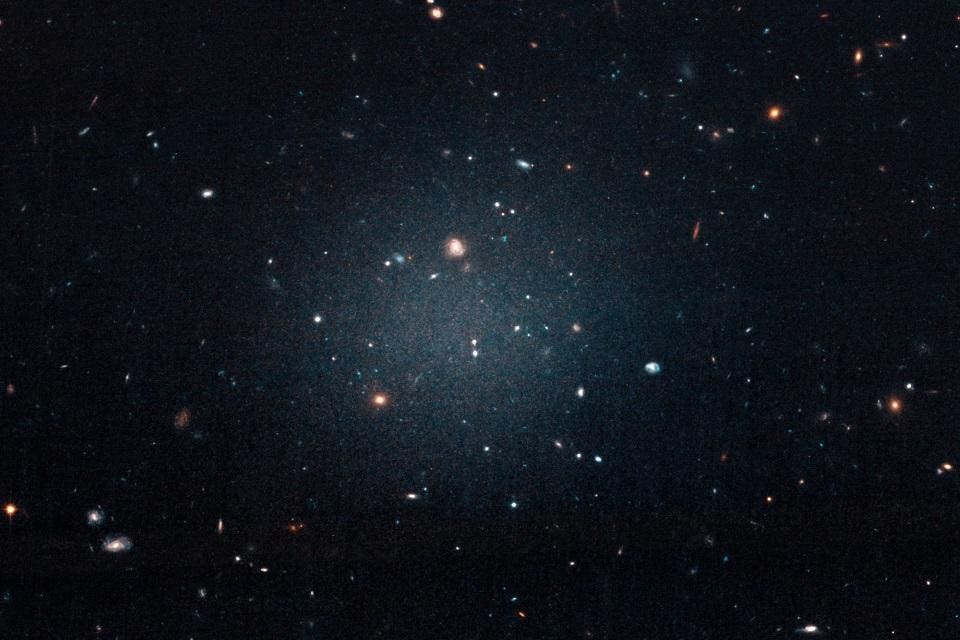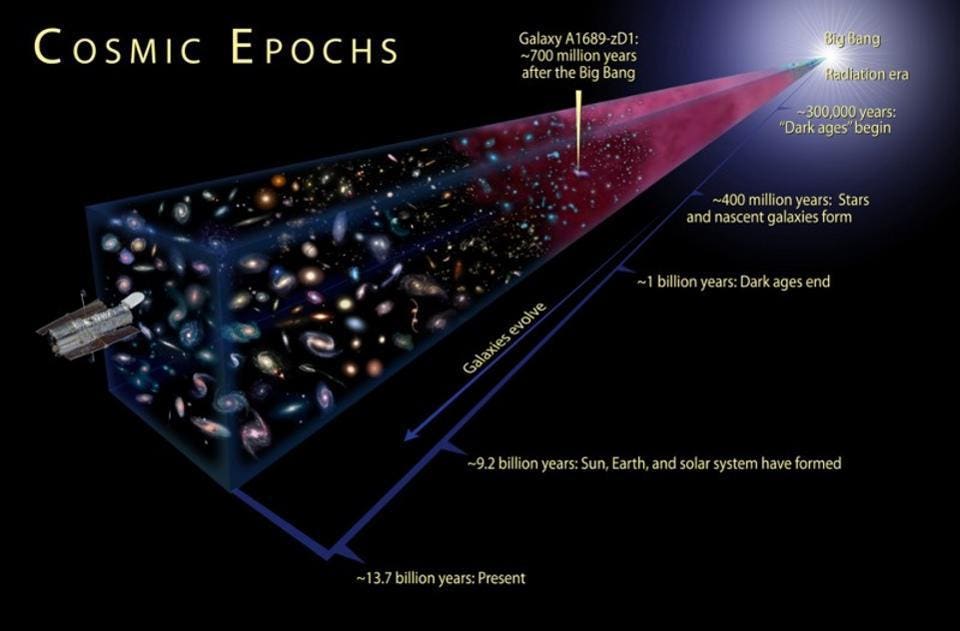This article does well describing the current knowledge of the history of our universe, and the questions and misconceptions involved.
From: Cosmology's Only Big Problems Are Manufactured Misunderstandings
Cosmology's Only Big Problems Are Manufactured Misunderstandings

This large, fuzzy-looking galaxy is so diffuse that astronomers call it a “see-through” galaxy because they can clearly see distant galaxies behind it. The ghostly object, catalogued as NGC 1052-DF2, doesn’t have a noticeable central region, or even spiral arms and a disk, typical features of a spiral galaxy. But it doesn’t look like an elliptical galaxy, either, as its velocity dispersion is all wrong. Even its globular clusters are oddballs: they are twice as large as typical stellar groupings seen in other galaxies. All of these oddities pale in comparison to the weirdest aspect of this galaxy: NGC 1052-DF2 is very controversial because of its apparent lack of dark matter. This could solve an enormous cosmic puzzle.
NASA, ESA, AND P. VAN DOKKUM (YALE UNIVERSITY)
If you keep up with the latest science news, you're probably familiar with a large number of controversies concerning the nature of the Universe itself. Dark matter, thought to outweigh normal atomic matter by a 5-to-1 ratio, could be unnecessary, and replaced by a modification to our law of gravity. Dark energy, making up two-thirds of the Universe, is responsible for the accelerated expansion of space, but the expansion rate itself isn't even agreed upon. And cosmic inflation has recently been derided by some as unscientific, as some of its detractors claim it can predict anything, and therefore predicts nothing.
If you add them all together, as philosopher Bjørn Ekeberg did in his recent piece for Scientific American, you might think cosmology was in crisis. But if you're a scrupulous scientist, exactly the opposite is true. Here's why.

If you look farther and farther away, you also look farther and farther into the past. The earlier you go, the hotter and denser, as well as less-evolved, the Universe turns out to be. The earliest signals can even, potentially, tell us about what happened prior to the moments of the hot Big Bang.
Science is more than just a collection of facts, although it certainly relies on the full suite of data and information we've collected about the natural world. Science is also a process, where the prevailing theories and frameworks are confronted with as many novel tests as possible, seeking to either validate or refute the consequential predictions of our most successful ideas.
This is where the frontiers of science lie: at the edges of the validity of our leading theories. We make predictions, we go out and test them experimentally and observationally, and then we constrain, revise, or extend our ideas to accommodate whatever new information we obtained. The ultimate dream of many is to revolutionize the way we conceive of our world, and to replace our current theories with something even more successful and profound.
From: Cosmology's Only Big Problems Are Manufactured Misunderstandings
Cosmology's Only Big Problems Are Manufactured Misunderstandings

This large, fuzzy-looking galaxy is so diffuse that astronomers call it a “see-through” galaxy because they can clearly see distant galaxies behind it. The ghostly object, catalogued as NGC 1052-DF2, doesn’t have a noticeable central region, or even spiral arms and a disk, typical features of a spiral galaxy. But it doesn’t look like an elliptical galaxy, either, as its velocity dispersion is all wrong. Even its globular clusters are oddballs: they are twice as large as typical stellar groupings seen in other galaxies. All of these oddities pale in comparison to the weirdest aspect of this galaxy: NGC 1052-DF2 is very controversial because of its apparent lack of dark matter. This could solve an enormous cosmic puzzle.
NASA, ESA, AND P. VAN DOKKUM (YALE UNIVERSITY)
If you keep up with the latest science news, you're probably familiar with a large number of controversies concerning the nature of the Universe itself. Dark matter, thought to outweigh normal atomic matter by a 5-to-1 ratio, could be unnecessary, and replaced by a modification to our law of gravity. Dark energy, making up two-thirds of the Universe, is responsible for the accelerated expansion of space, but the expansion rate itself isn't even agreed upon. And cosmic inflation has recently been derided by some as unscientific, as some of its detractors claim it can predict anything, and therefore predicts nothing.
If you add them all together, as philosopher Bjørn Ekeberg did in his recent piece for Scientific American, you might think cosmology was in crisis. But if you're a scrupulous scientist, exactly the opposite is true. Here's why.

If you look farther and farther away, you also look farther and farther into the past. The earlier you go, the hotter and denser, as well as less-evolved, the Universe turns out to be. The earliest signals can even, potentially, tell us about what happened prior to the moments of the hot Big Bang.
Science is more than just a collection of facts, although it certainly relies on the full suite of data and information we've collected about the natural world. Science is also a process, where the prevailing theories and frameworks are confronted with as many novel tests as possible, seeking to either validate or refute the consequential predictions of our most successful ideas.
This is where the frontiers of science lie: at the edges of the validity of our leading theories. We make predictions, we go out and test them experimentally and observationally, and then we constrain, revise, or extend our ideas to accommodate whatever new information we obtained. The ultimate dream of many is to revolutionize the way we conceive of our world, and to replace our current theories with something even more successful and profound.

